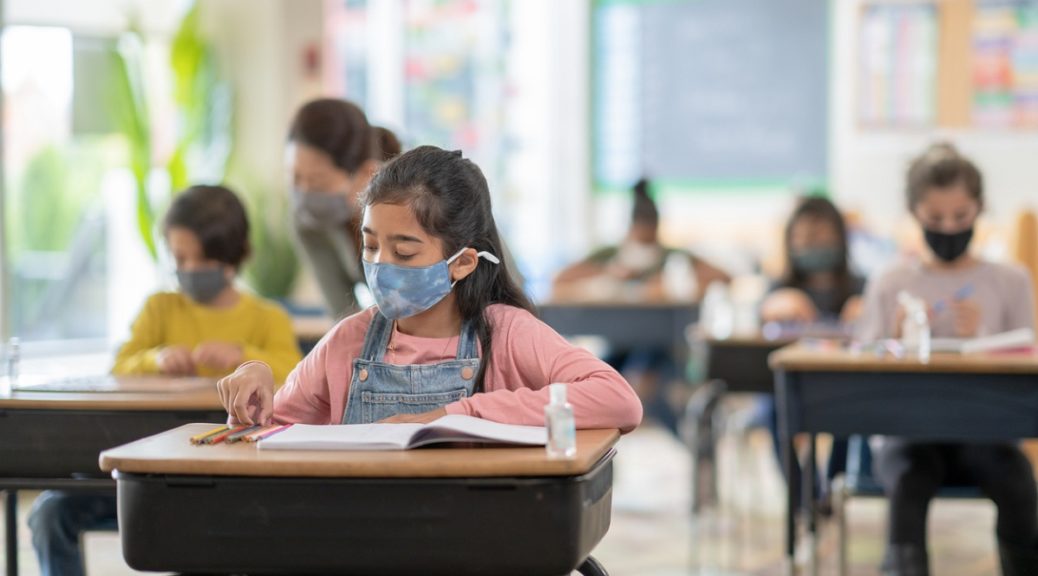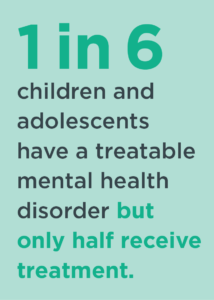Helping Kids Manage Back-to-School Stress

Heading back to school this year may be extra stressful for kids and teens as they readjust to more structured routines and full-time in-person learning. That’s on top of the stress and nerves that already come with adolescence, like worrying about grades, social groups, and making the team. They are still developing the parts of their brain that help them respond to adversity, adapt to change and manage stress, so you may be seeing some of this stress or other tough feelings displayed in challenging behaviors or acting out.
What to Expect With Behavior As Kids Return to School
Over the past 18 months, kids have experienced a lot of unpredictability and changing routines. Their school schedules and other activities were cut back significantly, they adjusted to online learning, and now most students are jumping back into the full swing of in-person school. This may create a range of tough feelings for some kids to work through.
A child might feel frustrated that they have no control over their day-to-day schedule or experiences. They may feel sadness or anger about no longer doing virtual learning, which for some youth meant more time with family and friends, time to get jobs and make money, or just more free time to do the things they enjoy. They may even be anxious about answering questions in front of their teachers or having social interactions with their peers after long periods of limited in-person time.
When children have trouble expressing their emotions, they may also struggle to control their reactions to those feelings. For some, back-to-school stress can trigger challenging behaviors that affect academic performance, the family dynamic at home, relationships, or even safety and wellness.

Examples of Acting Out or Concerning Behaviors May Include:
- Disengaging from relationships
- Verbal or physical aggression
- Defying authority
- Skipping school
- Vandalizing property
- Self-harm
Youth may also struggle internally with negative thoughts about their self-worth, suicidal ideation, isolation or depression. They may feel disconnected from the world around them. These concerning signs are harder to spot since they may be happening as internal dialogue, so it’s important to check in with kids frequently to ask them how they are doing or what feelings they have about things going on around them.
How Caregivers Can Provide Support
Communicate with school personnel to helps kids adjust. Talk to the school’s administrators, teachers, or counselors to understand schedules, expectations for students, and plans for supporting students. Then you can clearly explain this information to your child so they know what to expect. Stay in touch with school personnel throughout the year for feedback about how your child is doing and attend parent-teacher conferences.
Use prompting language. Each night, tell a child what their schedule for the next day looks like. If there are going to be last minute changes, let them know as soon as possible and do so calmly. It gives them comfort to know what to expect so they don’t feel anxious about more uncertainties.
Teach kids time management skills. Give them tips and resources that will help them stay on track with homework, school activities and household chores. Help them make sure they are setting aside time for fun and relaxation, too.
Validate their feelings. Allow them to express their feelings openly without judgement and don’t respond negatively. Let them know that it is okay to have a lot of different or big feelings and that you are proud of them for sharing their feelings.
Help them identify safe people, places and activities. This gives them a roadmap of things they can do to help them address difficult feelings before they become overwhelming. It also helps teach them important skills for regulating their emotions and coping.

Reduce stress in the home. Kids need time to unwind from the school day. Give them space and time to recharge. Encourage them to find activities that help them reduce stress—like exercising, exploring nature, listening to music, meditating, or arts and crafts. Model calm, patient behaviors for them. Kids can tell when caregivers are stressed and they’re observing how you handle that stress so it’s important to show them healthy habits and self-care.
Lean into mental health services. Don’t be afraid to ask for help. People need an outlet when things don’t feel okay or they feel isolated, disconnected or depressed. Help them find that outlet or resource so concerns can be addressed quickly.
Reach Out to a Child’s School About Mental Health Support
The Federal government is placing high priority on increasing mental health support and resources for students and staff.
Earlier this month, the US Department of Education released the “2021 Return to School Roadmap” resource to help families and communities prepare for the new school year.
The Roadmap includes three “Landmark” top priorities for the school year:
- Prioritize the health and safety of students, school personnel, and families.
- Build school communities, and support students’ social, emotional, and mental health.
- Accelerate academic achievement.
Key points of Landmark 2 ensure students are set up for success this academic year by focusing on:
- Assessing social, emotional, and mental health needs of students and staff
- Investing in effective strategies to address social, emotional, and mental health needs of students.
- Providing professional development for educators and staff to address these needs
- Investing in school counselors and mental health professionals in schools
- Ensuring restorative, equitable, and inclusive approaches to school discipline
- Providing extracurricular opportunities to build school community and advance academic and emotional development of students
Your child’s teachers, administrators, or a school counselor are all great resources to reach out to if you have concerns about your child’s behavior. They can keep an eye out at school for warning signs, give your child extra support, and help you connect to community resources for services and support. Your child’s school personnel care deeply about their wellbeing and the more you are connected with them, the better able you all are to make sure your child has everything they need to be successful and happy.
Where to Go for Additional Support and Guidance
Visit www.kvchospitals.org to access free eBooks, videos, blogs and other resources for assessing your child’s mental wellbeing, teaching them tools for regulating their emotions and coping, therapeutic activities families can do together at home, and more.
School administrators can also reach out to us for help developing trauma-informed practices, creating a toolbox of mental health resources for kids and families, or any consultation around how to help kids regulate their emotions. Click this link to submit a form to contact our team if your school is interested in consultation and guidance.





